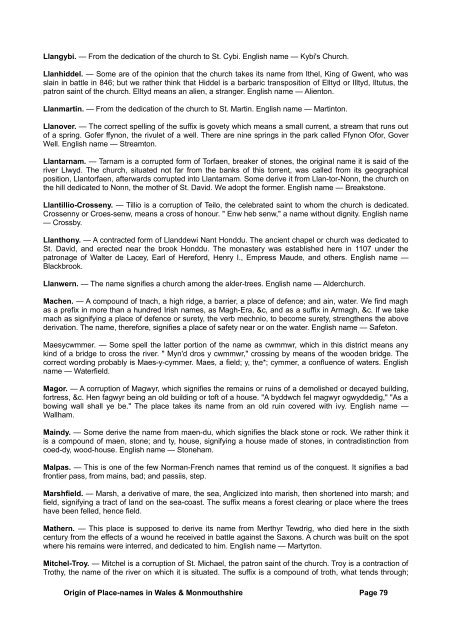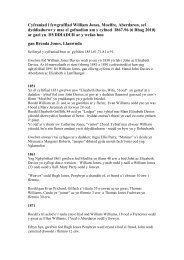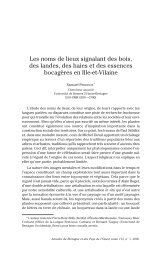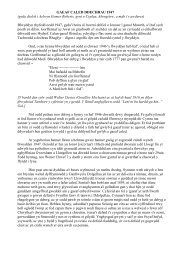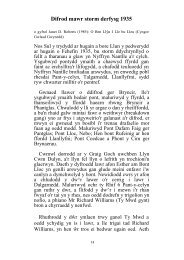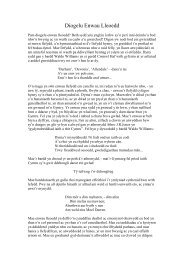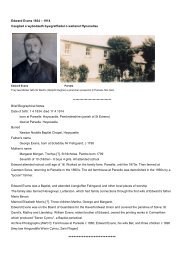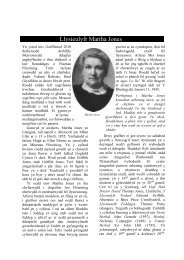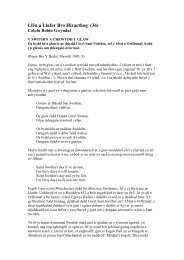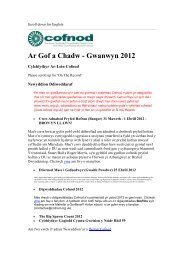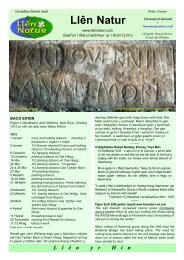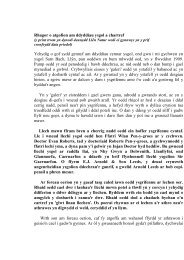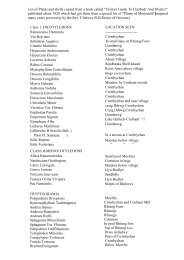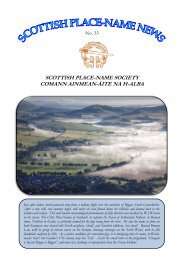Llangybi. — From <strong>the</strong> dedication <strong>of</strong> <strong>the</strong> church to St. Cybi. English name — Kybi's Church.Llanhiddel. — Some are <strong>of</strong> <strong>the</strong> op<strong>in</strong>ion that <strong>the</strong> church takes its name from I<strong>the</strong>l, K<strong>in</strong>g <strong>of</strong> Gwent, who wassla<strong>in</strong> <strong>in</strong> battle <strong>in</strong> 846; but we ra<strong>the</strong>r th<strong>in</strong>k that Hiddel is a barbaric transposition <strong>of</strong> Elltyd or Illtyd, Iltutus, <strong>the</strong>patron sa<strong>in</strong>t <strong>of</strong> <strong>the</strong> church. Elltyd means an alien, a stranger. English name — Alienton.Llanmart<strong>in</strong>. — From <strong>the</strong> dedication <strong>of</strong> <strong>the</strong> church to St. Mart<strong>in</strong>. English name — Mart<strong>in</strong>ton.Llanover. — The correct spell<strong>in</strong>g <strong>of</strong> <strong>the</strong> suffix is govety which means a small current, a stream that runs out<strong>of</strong> a spr<strong>in</strong>g. G<strong>of</strong>er ffynon, <strong>the</strong> rivulet <strong>of</strong> a well. There are n<strong>in</strong>e spr<strong>in</strong>gs <strong>in</strong> <strong>the</strong> park called Ffynon Ofor, GoverWell. English name — Streamton.Llantarnam. — Tarnam is a corrupted form <strong>of</strong> Torfaen, breaker <strong>of</strong> stones, <strong>the</strong> <strong>orig<strong>in</strong></strong>al name it is said <strong>of</strong> <strong>the</strong>river Llwyd. The church, situated not far from <strong>the</strong> banks <strong>of</strong> this torrent, was called from its geographicalposition, Llantorfaen, afterwards corrupted <strong>in</strong>to Llantarnam. Some derive it from Llan-tor-Nonn, <strong>the</strong> church on<strong>the</strong> hill dedicated to Nonn, <strong>the</strong> mo<strong>the</strong>r <strong>of</strong> St. David. We adopt <strong>the</strong> former. English name — Breakstone.Llantillio-Crosseny. — Tillio is a corruption <strong>of</strong> Teilo, <strong>the</strong> celebrated sa<strong>in</strong>t to whom <strong>the</strong> church is dedicated.Crossenny or Croes-senw, means a cross <strong>of</strong> honour. " Enw heb senw," a name without dignity. English name— Crossby.Llanthony. — A contracted form <strong>of</strong> Ll<strong>and</strong>dewi Nant Honddu. The ancient chapel or church was dedicated toSt. David, <strong>and</strong> erected near <strong>the</strong> brook Honddu. The monastery was established here <strong>in</strong> 1107 under <strong>the</strong>patronage <strong>of</strong> Walter de Lacey, Earl <strong>of</strong> Hereford, Henry I., Empress Maude, <strong>and</strong> o<strong>the</strong>rs. English name —Blackbrook.Llanwern. — The name signifies a church among <strong>the</strong> alder-trees. English name — Alderchurch.Machen. — A compound <strong>of</strong> tnach, a high ridge, a barrier, a <strong>place</strong> <strong>of</strong> defence; <strong>and</strong> a<strong>in</strong>, water. We f<strong>in</strong>d maghas a prefix <strong>in</strong> more than a hundred Irish <strong>names</strong>, as Magh-Era, &c, <strong>and</strong> as a suffix <strong>in</strong> Armagh, &c. If we takemach as signify<strong>in</strong>g a <strong>place</strong> <strong>of</strong> defence or surety, <strong>the</strong> verb mechnio, to become surety, streng<strong>the</strong>ns <strong>the</strong> abovederivation. The name, <strong>the</strong>refore, signifies a <strong>place</strong> <strong>of</strong> safety near or on <strong>the</strong> water. English name — Safeton.Maesycwmmer. — Some spell <strong>the</strong> latter portion <strong>of</strong> <strong>the</strong> name as cwmmwr, which <strong>in</strong> this district means anyk<strong>in</strong>d <strong>of</strong> a bridge to cross <strong>the</strong> river. " Myn'd dros y cwmmwr," cross<strong>in</strong>g by means <strong>of</strong> <strong>the</strong> wooden bridge. Thecorrect word<strong>in</strong>g probably is Maes-y-cymmer. Maes, a field; y, <strong>the</strong>*; cymmer, a confluence <strong>of</strong> waters. Englishname — Waterfield.Magor. — A corruption <strong>of</strong> Magwyr, which signifies <strong>the</strong> rema<strong>in</strong>s or ru<strong>in</strong>s <strong>of</strong> a demolished or decayed build<strong>in</strong>g,fortress, &c. Hen fagwyr be<strong>in</strong>g an old build<strong>in</strong>g or t<strong>of</strong>t <strong>of</strong> a house. "A byddwch fel magwyr ogwyddedig," "As abow<strong>in</strong>g wall shall ye be." The <strong>place</strong> takes its name from an old ru<strong>in</strong> covered with ivy. English name —Wallham.Ma<strong>in</strong>dy. — Some derive <strong>the</strong> name from maen-du, which signifies <strong>the</strong> black stone or rock. We ra<strong>the</strong>r th<strong>in</strong>k itis a compound <strong>of</strong> maen, stone; <strong>and</strong> ty, house, signify<strong>in</strong>g a house made <strong>of</strong> stones, <strong>in</strong> contradist<strong>in</strong>ction fromcoed-dy, wood-house. English name — Stoneham.Malpas. — This is one <strong>of</strong> <strong>the</strong> few Norman-French <strong>names</strong> that rem<strong>in</strong>d us <strong>of</strong> <strong>the</strong> conquest. It signifies a badfrontier pass, from ma<strong>in</strong>s, bad; <strong>and</strong> passiis, step.Marshfield. — Marsh, a derivative <strong>of</strong> mare, <strong>the</strong> sea, Anglicized <strong>in</strong>to marish, <strong>the</strong>n shortened <strong>in</strong>to marsh; <strong>and</strong>field, signify<strong>in</strong>g a tract <strong>of</strong> l<strong>and</strong> on <strong>the</strong> sea-coast. The suffix means a forest clear<strong>in</strong>g or <strong>place</strong> where <strong>the</strong> treeshave been felled, hence field.Ma<strong>the</strong>rn. — This <strong>place</strong> is supposed to derive its name from Merthyr Tewdrig, who died here <strong>in</strong> <strong>the</strong> sixthcentury from <strong>the</strong> effects <strong>of</strong> a wound he received <strong>in</strong> battle aga<strong>in</strong>st <strong>the</strong> Saxons. A church was built on <strong>the</strong> spotwhere his rema<strong>in</strong>s were <strong>in</strong>terred, <strong>and</strong> dedicated to him. English name — Martyrton.Mitchel-Troy. — Mitchel is a corruption <strong>of</strong> St. Michael, <strong>the</strong> patron sa<strong>in</strong>t <strong>of</strong> <strong>the</strong> church. Troy is a contraction <strong>of</strong>Trothy, <strong>the</strong> name <strong>of</strong> <strong>the</strong> river on which it is situated. The suffix is a compound <strong>of</strong> troth, what tends through;Orig<strong>in</strong> <strong>of</strong> Place-<strong>names</strong> <strong>in</strong> Wales & Monmouthshire Page 79
<strong>and</strong> gwy, water. Treiddiod troth tnaen — let it burst through <strong>the</strong> rock. Trwydded means a passage through.This river-name implies a violent or furious water. Or it may be a contraction <strong>of</strong> tre-wy, <strong>the</strong> town by <strong>the</strong> water.We adopt <strong>the</strong> former. English name — Borewater or Passwater.Mounton. — A corruption <strong>of</strong> <strong>the</strong> old name <strong>of</strong> <strong>the</strong> <strong>place</strong>, Monckton, <strong>the</strong> monk's town, probably so called from<strong>the</strong> monks <strong>of</strong> Chepstow, who for some centuries held <strong>the</strong> ti<strong>the</strong>s <strong>and</strong> provided a priest for <strong>the</strong> church. Englishname — Monkton.Nantyglo. — Nant, brook; y, <strong>the</strong>; glo, coal; signify<strong>in</strong>g <strong>the</strong> coal brook, from <strong>the</strong> fact, it is said, that <strong>in</strong> this <strong>place</strong>coal was first used to make iron, about <strong>the</strong> middle <strong>of</strong> <strong>the</strong> eighteenth century. English name — Coalbrook.Nash. — From <strong>the</strong> Norse ness or naze, which means a nose or promontory <strong>of</strong> l<strong>and</strong>. Norse <strong>names</strong> arefrequently found on <strong>place</strong>s fr<strong>in</strong>g<strong>in</strong>g our coasts, such as Stack Rocks, Penyholt Stack, Stockholm Isl<strong>and</strong>,Nash, &c. This <strong>place</strong> is situated on <strong>the</strong> coast <strong>of</strong> <strong>the</strong> Bristol Channel.Newbridge. — A translation <strong>of</strong> <strong>the</strong> Welsh name, Pontnewydd.Newcastle. — From <strong>the</strong> fortress which anciently stood here, surrounded by a moat.Panteg. — Pant, hollow; teg, fair; signify<strong>in</strong>g a beautiful vale, a name quite descriptive <strong>of</strong> <strong>the</strong> <strong>place</strong>. Englishname — Beauvale.Pengam. — It was anciently called Pont-maen-pen-gam, which signifies a bridge built on a bended rock, oron <strong>the</strong> river Pengam. Pengam means wry-headed. English name — Wryton or Twistton.Penma<strong>in</strong>. — A compound <strong>of</strong> pen, head, top ; <strong>and</strong> maen, a stone, a rock. English name — Topstone.Peterston. — From <strong>the</strong> dedication <strong>of</strong> <strong>the</strong> church to St. Peter.Ponthir. — Pont, bridge; hir, long; from a long bridge built over <strong>the</strong> river Llwyd about n<strong>in</strong>ety years ago. When<strong>the</strong> T<strong>in</strong> Works were first erected here, that is, prior to <strong>the</strong> erection <strong>of</strong> <strong>the</strong> bridge, <strong>the</strong> <strong>place</strong> was called GwaithNewydd, New Works, but with<strong>in</strong> <strong>the</strong> past sixty years Gwaith Newydd has given <strong>place</strong> to Ponthir. Englishname — Longbridge.Pontllanfraith. — Pont, bridge; llan, church fraith, a mutation, perhaps, <strong>of</strong> ffridd, a forest, a plantation. Orperhaps <strong>the</strong> church was dedicated to St. Ffraid or St. Faith. English name — Brideschurch.Pontnewynydd. — Some say this is a contraction <strong>of</strong> Pont-y-naw-mynydd, <strong>the</strong> bridge from which n<strong>in</strong>emounta<strong>in</strong>s are visible, but we cannot f<strong>in</strong>d so many mounta<strong>in</strong>s to support this derivation. It is more probably,says <strong>the</strong> Rev. J. Williams, Pontypool, derived from pont-dew<strong>in</strong>ydd, <strong>the</strong> bridge <strong>of</strong> <strong>the</strong> div<strong>in</strong>e. Dew<strong>in</strong>ydd is <strong>the</strong>old Welsh form <strong>of</strong> duw<strong>in</strong>ydd, div<strong>in</strong>e, <strong>the</strong>ologian. The bridge is supposed to have been built by a parson, adiv<strong>in</strong>e, called Sir Dafydd, vicar <strong>of</strong> Treveth<strong>in</strong>, <strong>in</strong> <strong>the</strong> reign <strong>of</strong> James or Charles I. Close to <strong>the</strong> bridge <strong>the</strong>re arerema<strong>in</strong>s <strong>of</strong> his residence, whilst <strong>the</strong> narrow meadow, adjo<strong>in</strong><strong>in</strong>g, is called Waun Sir Dafydd, Sir David'smeadow. English name— Priestbridge.Pontrhydyrun. — A compound <strong>of</strong> pont, bridge; rhyd, ford; yr, <strong>the</strong>; ynn, ash tree; signify<strong>in</strong>g <strong>the</strong> bridge across<strong>the</strong> ash-tree ford. English name— Ashford Bridge.Pontrilas. — The name probably means <strong>the</strong> bridge <strong>of</strong> <strong>the</strong> three rivers. Lais is an old British word, st<strong>and</strong><strong>in</strong>gfor water, or stream, <strong>and</strong> here we have three rivers meet<strong>in</strong>g, <strong>and</strong> just below <strong>the</strong> confluence a bridge is thrownacross; hence Pont-tri-lais. Some say it is <strong>the</strong> Pont-tri-llais, <strong>the</strong> bridge <strong>of</strong> <strong>the</strong> three murmur<strong>in</strong>g streams.O<strong>the</strong>rs th<strong>in</strong>k it is a clipped form <strong>of</strong> Pont-rhyd- Dulas, <strong>the</strong> bridge on <strong>the</strong> ford <strong>of</strong> Dulas. English name —Bridgewater.Pontymistr. — A corruption <strong>of</strong> Pont-y-m<strong>in</strong>ster, <strong>the</strong> cloister or abbey bridge. M<strong>in</strong>ster is <strong>the</strong> Anglo-Saxon form<strong>of</strong> <strong>the</strong> Lat<strong>in</strong> monasttrium, <strong>and</strong> is a frequent component <strong>in</strong> English <strong>and</strong> European <strong>place</strong>-<strong>names</strong>, as Leom<strong>in</strong>ster,Westm<strong>in</strong>ster, Monstiers, &c It is supposed that a Conventual church once existed <strong>in</strong> this neighbourhood.English name — Abbey Bridge.Pontymoil. — A compound <strong>of</strong> pont, bridge; <strong>and</strong> moel, a conical hill. The <strong>place</strong> lies at <strong>the</strong> foot <strong>of</strong> a hill calledMoel. English name — Bridgehill.Orig<strong>in</strong> <strong>of</strong> Place-<strong>names</strong> <strong>in</strong> Wales & Monmouthshire Page 80
- Page 1 and 2:
HANDBOOK OF THE ORIGIN OF PLACE-NAM
- Page 3 and 4:
§ § § § §The Author begs to st
- Page 5 and 6:
pitiful cries of the railway offici
- Page 7 and 8:
Bishop Percy says that "in England,
- Page 9 and 10:
The city of Chester is still popula
- Page 11 and 12:
There's Cumwhitton, Cumwhinton, Cum
- Page 13 and 14:
Llwyn in its primary' sense means a
- Page 15 and 16:
PLACE-NAMES IN WALES.Wales. — The
- Page 17 and 18:
Church are generally dedicated to e
- Page 19 and 20:
think he was a contemporary of St.
- Page 21 and 22:
Rhosbeirio. — Rhos, a moor, a dry
- Page 23 and 24:
of Brecknock," states that this vic
- Page 25 and 26:
Cam cnwir ef Cwmdu,Cwm gwyn yw & n
- Page 27 and 28:
Penderyn. — A corruption probably
- Page 29 and 30:
Ardudwy. — Ar, upon or above; tud
- Page 31 and 32: to mark its pre-eminence over the o
- Page 33 and 34: Some think that eirw is a corruptio
- Page 35 and 36: present form — Caerfyrddin.Abergw
- Page 37 and 38: place of refuge; hence the name. En
- Page 39 and 40: Llansawyl. — The church was dedic
- Page 41 and 42: eject. The village took its name fr
- Page 43 and 44: house, and attempted to kill an inf
- Page 45 and 46: Gwydir. — Prima facie one may tak
- Page 47 and 48: Nefyn. — The church was probably
- Page 49 and 50: DENBIGHSHIRE.Anglicized form of Din
- Page 51 and 52: Llangollen. — From Collen, a sain
- Page 53 and 54: hands into their pockets to pay a c
- Page 55 and 56: Cefn. — The name signifies a ridg
- Page 57 and 58: Maesgarmon. — Named in honour of
- Page 59 and 60: Abertridwr. — Tridwr, three water
- Page 61 and 62: it is said, was originally built by
- Page 63 and 64: Cwmllynfell. — Cwm, a narrow vale
- Page 65 and 66: Gwarycaeau. — Gwdr, the nape of t
- Page 67 and 68: means a cultivated region, a vale,
- Page 69 and 70: Penrhiwfer.- Pen, head, top; rhiw,
- Page 71 and 72: Port Talbot. — So called in 1835
- Page 73 and 74: Trealaw. — This appellation was g
- Page 75 and 76: Aberdyfi. — So called from its si
- Page 77 and 78: Llanddwywe. — From Dwywau, a desc
- Page 79 and 80: Crickhowell and some in the directi
- Page 81: Griffithstown. — This village was
- Page 85 and 86: derive Tintern from din, fortified
- Page 87 and 88: Caersws. — It appears that the Ro
- Page 89 and 90: English name — Ervylton.Llanymech
- Page 91 and 92: Angle. — Probably from the angle-
- Page 93 and 94: Gellyswick. — Another hybrid. Gel
- Page 95 and 96: that the two rivers in their flowin
- Page 97 and 98: ecame the bishop of the see, and wa
- Page 99 and 100: earth formerly stood on a summit on
- Page 101 and 102: Pilleth. — A corruption of pwll,
- Page 103 and 104: Howells, Rev. J., Mountain AshHowel
- Page 105 and 106: Williams, D., PenywernWilliams, Rev


